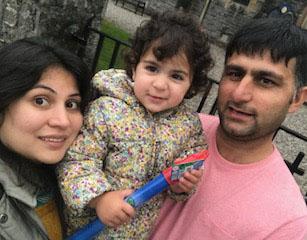Home Office immigration delays nearly double as thousands 'left in limbo' for more than a year, figures show
Exclusive: Number of people waiting longer than government's six-month target time for UK settlement decisions soars despite 22 per cent drop in applications
The number of people waiting longer than the Home Office’s target time for their immigration claims to be processed has soared despite a considerable drop in cases, The Independent can reveal.
The government has been accused of leaving thousands of people in a “state of limbo” as figures show the proportion of UK settlement applications taking more than than six months to resolve has almost doubled in three years.
People who have lived in the UK for more than a decade say they had been made suicidal by the delays, unable to visit dying relatives or apply for jobs as the Home Office retains their passports throughout the process.
Lawyers and politicians branded the delays in deciding applications for indefinite leave to remain “unacceptable” and said the fact that waiting times had increased despite a drop in applications indicated a drive to deter migrants as part of the hostile environment.
Data obtained by The Independent through a freedom of information request reveal more than one in 10 applicants – amounting to 8,210 people – waited for longer than the Home Office’s own six-month customer service standard before receiving a decision in 2017, compared with 6 per cent – or 5,627 – in 2014.
This is despite the fact that the number of applications processed decreased by a fifth in the same period, from 95,651 to 74,952.
The Home Office said “occasional” delays arose due to the “complex nature” of certain applications – and said that applicants could obtain their passports “if they chose to withdraw their visa application”.
One man, who has lived in the UK for more than a decade, said he was made to feel suicidal after waiting for more than two years for the Home Office to process his settlement application.
Mushtaque Shah and his wife Sehar, Pakistani nationals who have a British-born daughter, have been unable to visit terminally ill relatives before they died because the Home Office is holding onto their passports.

Describing being unable to see his uncle when he got ill, Mr Shah said: “He raised me until the age of 18; he was like a dad to me. I called the Home Office every month, but the only answer I’d get is it is it’s ‘in progress’.
“He died and I couldn’t see him. I was suicidal in that week.”
In another case, Noory Ahmad, who fled the war in Iraq in 2000, had to wait five years for a decision after claiming for asylum in the UK in 2003. During this time, he was unable to work and claim benefits, meaning he spent long periods of time homeless.
With no passport or status, the 43-year-old was also unable to leave the country, meaning he couldn’t see his parents when they got ill.
“It was a nightmare for me. I lost my dad, and a few years later I lost my mum, and I wasn’t able to see either of them,” he said.

“I wasn’t allowed to work, I had nowhere to live, no support, I wasn’t allowed to study. I had to rely on different friends. I went from house to house, from city to city.”
Once Mr Ahmad was granted indefinite leave to remain in 2008, he managed to move on with his life, and now lives in Coventry with his partner and two children, but he feels years of his life were “wasted”.
It comes amid mounting criticism of the Home Office’s hostile environment policies following the Windrush scandal, which exposed that thousands of Commonwealth citizens had been wrongly targeted by immigration officials, with some detained and deported.
Shadow Home Secretary Diane Abbott condemned the government for ”not prioritising the delays at the Home Office despite the reduction in the number of applications being processed”.
“It is unfair and unacceptable to leave applicants waiting for long periods, concerned for their futures,” she added.
Immigration barrister Jan Doerfel told The Independent the figures were “of considerable concern” and raised the question over whether the delays were being used to deter valuable migrants as part of the hostile environment.
“The human costs of delay in terms of stress and uncertainty on applicants and their families is enormous and the Home Office service standards of six months to determine applications is already unacceptably long,” he said.
“The reduction of delays should be rendered a priority and not be used to deter migrants who make a valuable contribution to the UK as part of the hostile environment.”
The data shows that in the first six months of 2018, one in 20 people (2,618) who received decisions had waited for more than a year in 2017, compared with 1,792 (1.9 per cent) in 2014.
A total of 221 decisions took more than two years, with 13 claimants waiting for more than a decade and one case taking 29 years.
The Home Office said the majority of delays occurred on “non-straightforward” or “complex” cases, but experts said the department was increasingly using this reason to delay decisions for long periods of time.
Satbir Singh, chief executive of the Joint Council for the Welfare of Immigrants (JCWI), said: “We’re seeing the waiting time go up in all manner of immigration cases. It’s all too common to see people waiting for two years or more on these applications.
“Saying the case is ‘complex’ is often used as a convenient way to delay them for long periods of time.
“We’ve seen people who are changing jobs or have been on maternity leave unable to get back into the workplace because they don’t have the right papers. These people are also unable to access public funds. It’s an entirely unnecessary waste of not only time, but people’s lives.”
Chai Patel, legal director of policy at the JCWI, highlighted that the delays were causing people to face separation from loved ones and to return to deadly danger, and the destruction of the friends, family groups, and homes they’ve found in the UK.
He continued: “It’s very easy to be bored by delays and missed targets in the Home Office. You have to remember that in each case a person – a father, a mother, a child – is waiting in limbo for a decision that will alter the course of their whole life and potentially that of their family as well.
“Every additional day of waiting is agony, and the Home Office needs to wake up to that.”
To obtain UK settlement – which grants the right to remain in the UK without a time limit – a person must usually either have lived in the country for more than five years or have a close family member settled in the country. The cost of applying is £2,389.
A Home Office spokesperson said: “While it appears that a small number of cases have waited a significant amount of time for their case to be resolved, the reality is that these are outliers caused by data errors and the way our system records applications. It is not true to say someone has waited over 20 years for a decision on their application.
“We decide 99.5 per cent of cases within the service standard for straightforward indefinite leave to remain applications, which account for the majority of these cases.
“However, immigration cases can be complex and the public would expect that when granting a person the right to remain in the UK indefinitely we rigorously check the information submitted; as a result, some applications can take longer than others.”
Join our commenting forum
Join thought-provoking conversations, follow other Independent readers and see their replies
Comments
Bookmark popover
Removed from bookmarks